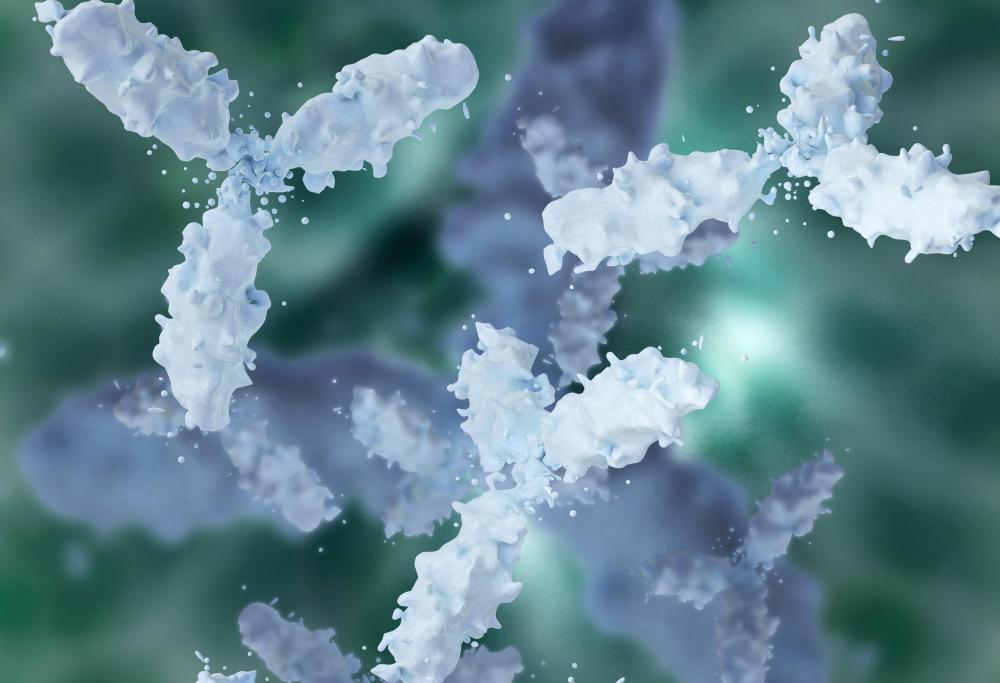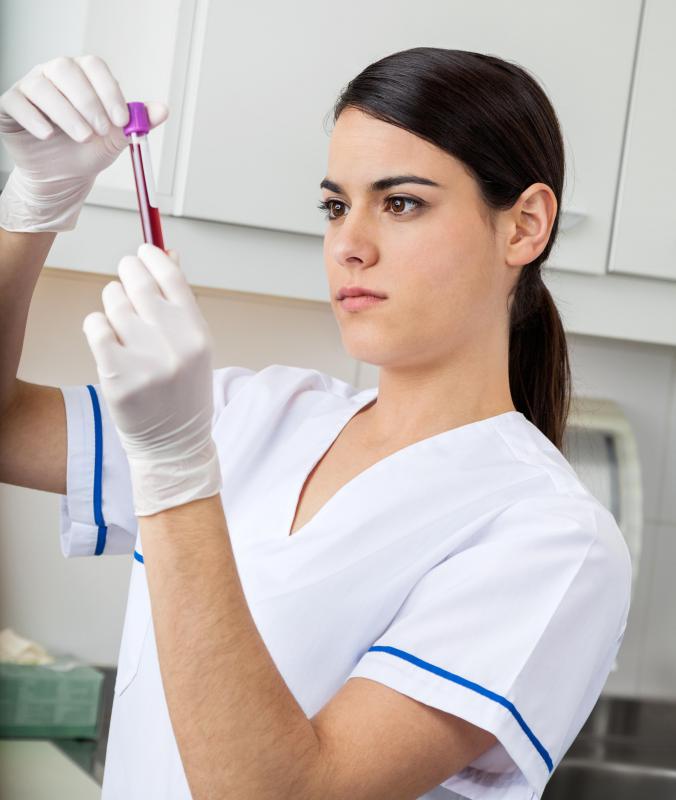At TheHealthBoard, we're committed to delivering accurate, trustworthy information. Our expert-authored content is rigorously fact-checked and sourced from credible authorities. Discover how we uphold the highest standards in providing you with reliable knowledge.
What Is the Treatment for IGG Deficiency?
An immunoglobulin G deficiency, called IgG deficiency, can be treated with antibiotics in mild cases when infection erupts or intravenous replacement therapy in severe cases where antibiotics prove ineffective. Some patients with an IgG deficiency take a broad-spectrum antibiotic each day to prevent the recurrence of infection. Doctors might rotate the type of medication to prevent antibiotic resistance to one particular drug.
IgG represents one of three classes of antibodies found in human blood, with IgG considered the most important to fight infection. When an IgG deficiency occurs, a patient might suffer from repeated upper respiratory infections of the sinuses, throat, ears, or chest. A regimen of antibiotics generally clears the infection, but it returns after the medication is stopped.

Treatment of patients with an IgG deficiency sometimes involves preventative doses of antibiotics each day. First, the infection is cleared up before preventative medication begins. This therapy usually treats patients who frequently miss work or school because of repeated respiratory infections.
If antibiotic treatment fails to ward off illness, immunoglobulin might be administered intravenously. IgG antibodies are infused into the blood during a procedure that commonly takes one to three hours. If the body begins making adequate levels of IgG, the therapy is discontinued, which is common in young children.

The human immune system consists of proteins and cells that fight foreign material that causes infection. When this system malfunctions, repeated infection occurs. A child’s immune system does not produce IgG until he or she is about six months old; the fetus gets antibodies from the mother while in the womb. If the child’s body does not begin producing the substance, it might lead to an IgG deficiency, provoking repeated sickness. He or she commonly outgrows the condition by the age of three.

IgG deficiency is typically discovered through a blood test that measures the level of immunoglobulin. Sometimes the tests show normal when a deficiency exists because there are four subclasses of IgG. If one subclass registers higher than normal, it may skew results. To obtain an accurate measurement, all four subtypes should be evaluated. Researchers do not know what causes the deficiency, but it might be linked to a gene on a chromosome that malfunctions.

If genes that regulate the immune system are at fault, there is no cure for the deficiency. An infant born with this abnormality might need lifelong treatment. If the problem stems from an immature immune system, it might resolve on its own over time, and IgG treatment can be discontinued.
AS FEATURED ON:
AS FEATURED ON:


















Discussion Comments
Interesting finding this article now!! I have also been a member of the IGG deficiency world for about 10 years now as well having infusions every three weeks now. I was recently asked by another doctor what was my condition? Confused at the question, I said that I did not know why, so they told me to ask my immunologist what the contribution action was.
I did not have an immunologist doctor. I had an oncology doctor. I asked and he said because I had a malabsorption problem. That doctor retired and now I'm seeing a new oncologist who says not, it is not due to this, but he would find out for me. This is after covid with no infusions for 10 months, but confined in my home as well.
During that time, I did become sick with a fungal infection and lost 120 pounds. I also cannot swallow food and have no hair left on my head, where before I had a full head of hair 3 months prior. I'm living on Boost and whatever I can get down without choking. It leaves me wondering why? What? Where? The fact that I had no IGG therapy for 10 months and now I'm getting them every 2 weeks and now all of a sudden, I'm having terrible pain – the worst pain ever in my lower left quadrant. I called the ambulance and went to the emergency room, presenting with kidney stones. I left the ER nine hours later with no stones and no relief whatsoever and no diagnosis -- all lab work came back fine, they say. (After looking at labs there were, of course, the Duh! Factor, with me not having been able to eat and losing 100 pounds and the lab work coming in a bit low !) It all leaves me very scared and unsure of what to do or go next.
If anyone stumbles across this article and the comment section, I would love to be enlightened by anyone.
Insurance will not always pay for replacement treatments. I have been frustrated that I have to wait until antibiotics no longer work before my insurance will pay for replacement therapy. I have shopped around but the insurances I have looked at all say them same thing for me.
Does anyone know why we have low igm...Igg?
For goodness' sake! Stop taking antibiotics as they set you up with even more problems. Find out the cause of the problem and work on that. You may need to go outside of traditional western medicine to find someone who understands how the body works.
@turkay1-- I get IgG transfusions once a week but I don't think it's the same for everyone. It depends on how serious the deficiency is. If the body produces some IgG on its own, it wouldn't be necessary to get a transfusion as often.
I've had this deficiency for over ten years. For the first six years I was on antibiotics. Even though my doctor changed the kind of antibiotic from time to time, the bacteria still became immune to all of them. The antibiotics basically stopped working and I had no choice but to switch to replacement therapy.
I do wonder if it had been better to receive the replacement therapy from the beginning. But doctors don't start replacement therapy until the IgG immune deficiency has gotten really bad.
I've been diagnosed with IgG subclass deficiency recently although looking at how often I've gotten sick in the past couple of years, this is not new. I just wasn't diagnosed until now. I'm on antibiotics but not constantly. I take a few days off in between courses but I have to get right back on because my fever comes back.
My doctor is still trying to figure out how bad my deficiency is before he decides if I should stick with antibiotics or if I need intravenous replacement therapy.
I've actually gotten used to being sick all the time now. My kitchen looks like a pharmacy, it's an ongoing struggle to keep myself going and continue working and continue my life. I do wish that there was a permanent one-time treatment for this deficiency. I'm frustrated with having to explain myself to people all the time. Up until I was diagnosed with this, all of the doctors I visited basically gave me blank stares when I told them what was happening.
It's good to finally know what's wrong with me. But I doubt that things will get much better unless my body miraculously starts making IgG again.
I know that continuous use of antibiotics is generally not recommended because it's really hard on the kidneys and can cause kidney malfunction at one point. I'm not too familiar with IgG deficiency treatments. But based on what I learned from this article, IgG infusions sound like the better option for people who have this deficiency.
What I'm curious about is how often do IgG infusions need to take place? Does the infused IgG in the blood diminish after some time requiring another infusion?
And which organ is responsible for the production of IgG? I wonder if an alternative treatment relating to that organ could be found for this deficiency.
Post your comments